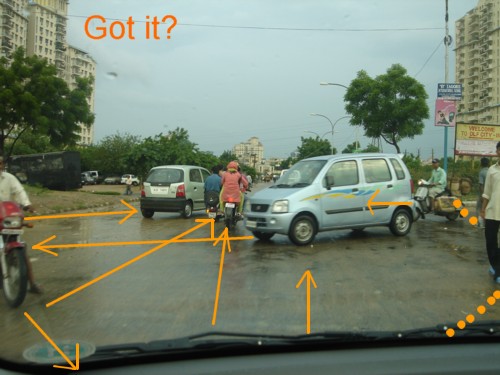A bright, sunny day. 10:25am at the Egg Shop. An elderly man is being handed his two dozen eggs in two precariously thin paper bags. He picks them up and balances them home.
Next in line is a filthy little urchin with a grimy jute bag. He places two plastic egg trays on the counter. Silently. That’s code-do for: I would like to have these filled with eggs, please.
This, however, does not happen. A buxom lady woman overtakes me, marches to the counter, waves two 10-Rupee-Notes and demands six eggs.
Nice.
„Excuse me“, I say. „I am not standing here for fun. Go back in line.“
She steps aside, more out of shock for having been reprimanded than for a sudden realization of manners. But she collects her wits quickly: „What are you waiting for?“, she snaps at me.
„My turn“, I say and point at the urchin in front of me.
„He came later!“
This is the moment I fail to realize she deflected, so instead of pointing out to her that her turn comes after mine regardless of who may or may not be ahead of me, I simply answer: „He’s been here when I came“.
She negates this.
I confirm it.
Meanwhile, I place my order. And that is the bizarre part: The boy has to wait anyway. For two reasons: Firstly, he is only a dirty boy and therefore not a valid customer. Secondly, he places a large order meant for another shop. His existence there first in line at the egg shop could not possibly put other, more valued customers at the risk of losing two precious minutes of their life span.
That is what the woman next to me argues on: That two minutes are being wasted. I am unwilling to tune into what she is saying so I am not sure whether she means the boy or me, but someone is stealing two of her minutes.
This situation is totally absurd to me. This woman there is playing out the all-Indian trouble: She is better than the boy. Someone is always better than someone else and, by virtue of this undeniable fact, must be served first.
I step back from this awesome scene of human foolishness: The egg shop. The urchin. The woman. Firangi-Dani. Bitching about who came first. It is amazing! I wonder why she would put herself at risk of being beholden to this argument of inequality which she has put forward by telling me that This Boy Can Wait. I wonder whether it has occurred to her that, just as she is rubbishing his presence, someone else might come along and rubbish her presence, claiming superiority.
I would not file such behavior under „Long-term Strategy“. It does, however, occupy lots of space in the folder titled „Everyday occurrences“.
Like I said:
Nice!





